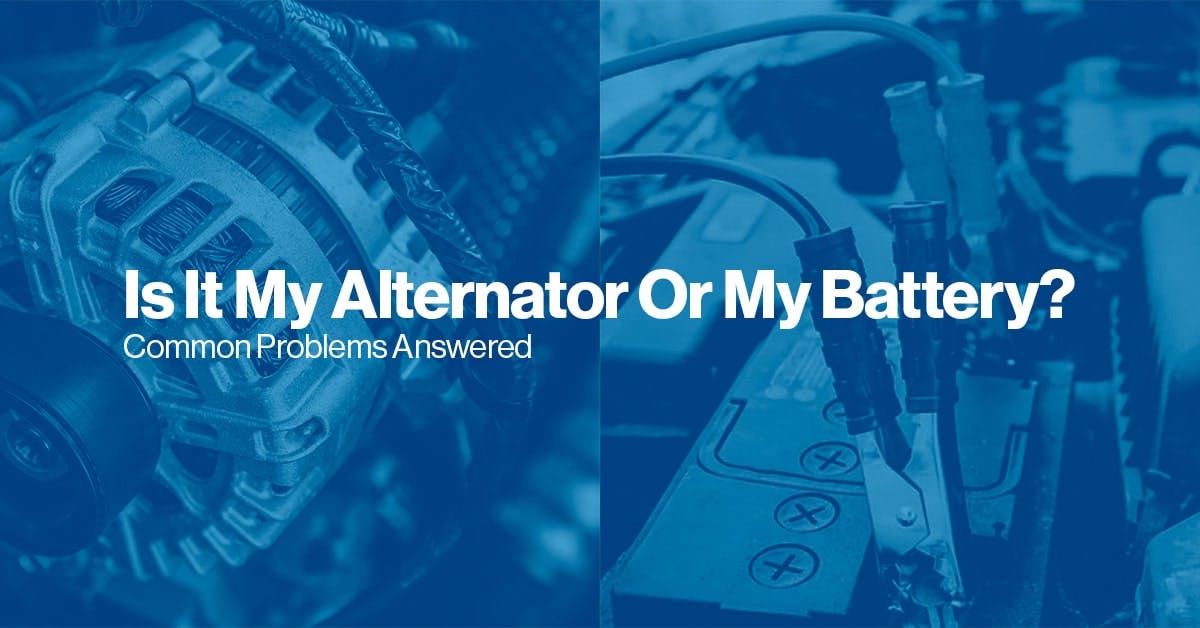As the alternator and battery in your car serve similar purposes, it can be difficult to tell which part is causing problems.
Read on and find out whether your battery or alternator is bad, and the warning signs and problems to look out for.
Page Contents
Is My Alternator Or Battery Bad?
Whilst the battery stores power to start the vehicle, the alternator recharges the battery and powers electrical systems once the engine is running.
This can make it difficult to tell which part is to blame.
To tell if the alternator or the battery is bad, you can try paying attention when you start your car.
If the car won’t start at all, the battery could be dead - or there could be a problem with the alternator, starter, or ignition system.
Alternatively, bad connections or a bad fuse could be causing issues.
If the car runs, but won’t hold a charge, the alternator may not be properly recharging the battery.
Sometimes alternator issues won't show up until the battery has lost its charge over time.
Signs of a Battery Problem
A battery can fail for a number of reasons.
Something as simple as leaving the lights on overnight can drain the battery.
Your vehicle may have a battery problem if you notice any of the following:
- Dim dashboard lights
- Dim headlights
- The engine won't start
- A sulphuric smell
Any of these warning signs can signal that your vehicle has a battery problem.
An 'eggy' smell is a sign that your battery is leaking, in which case you must have the battery replaced right away.
This sulphuric smell can also be caused by a bad alternator overcharging the battery.
The battery may also be dead if the engine won't turn over or takes longer to start.
You can check this by attempting to safely jump start your car.
If the car stays running for a while but fails to start the next time you try, you probably have a bad battery.
If the car immediately stalls, then it is more likely to be an alternator problem.
Even so, a car that starts after a jump can still point to an alternator issue.
Likewise, dim lights can signal both battery and alternator problems, so you shouldn't assume that the battery is the issue.
A mechanic will be able to identify which part is causing the problem for you.
Signs of an Alternator Problem
If your alternator is failing, then the battery may not have enough charge to start the car - which is why it can be so difficult to tell if the alternator or battery is the cause of the problem.
The main signs of an alternator problem are:
- Frequent engine stalling
- Dim or flickering headlights
- Dim or flickering interior lights
- Misbehaving electrics
- A squealing sound
- A burning smell
- A dead battery
You should have your vehicle looked at right away if you notice any of these alternator issues.
You alternator can fail due to old age, wear and tear or fluid leaking onto the component.
Any strange sounds from the radio, electric windows that are slow to close or a speedometer showing unusual readings can all point towards a bad alternator.
You may have a slipping alternator belt if you smell burning, hear growling or your lights are dim.
Squealing sounds can also indicate that the alternator belt might be worn or loose.
If you do smell burning, then you should have your vehicle looked at right away.
A professional mechanic will be able to find the source of the issue for you.
How to Maintain the Alternator and Battery
To keep your car's battery and alternator in good condition, you should inspect the battery terminals and alternator connections regularly.
Keeping the terminals clean and free of corrosion is important, and you should ensure that the alternator connections are secure and damage-free.
You can ask a professional mechanic to do this for you if you aren't confident doing this safely yourself.
Taking longer drives - as opposed to frequent short trips - can help to ensure that your battery gets a chance to charge fully.
Short trips may not give the alternator long enough to recharge the battery fully, which can lead to battery drain over time.
You can use a voltmeter to check your battery's voltage regularly, which can help you detect issues early on.
Once your battery has reached between 3 and 5 years of age, you should think about having it tested or replaced.
For an alternator, this lifespan can be closer to 10 years, depending on driving conditions, habits and how well maintained the part is.
Regular car servicing and addressing warning signs proactively is essential for maintaining the health of your car's alternator and battery.
How Do I Test My Alternator?
If you think that your alternator is causing the problem, you can test it using a voltmeter.
This device reads the electrical voltage of your battery and can let you know if your alternator is working correctly.
You can buy a voltmeter from any good automotive shop.
Make sure that the battery is fully charged before you conduct the test.
The voltmeter should read between 12.4 and 12.8 with the engine switched off if you have a healthy battery.
Next, start the engine and read the results - make sure that the lights and radio are off during the test to ensure you get an accurate reading.
If your alternator is working correctly, you should see higher readings, closer to 13.8 and 14.8 volts.
If the readings are above 15 volts, then your vehicle could be suffering from an overcharging alternator.
If the readings remain in the 12 volt range, you have an issue with your alternator which needs to be fixed by a professional mechanic.







